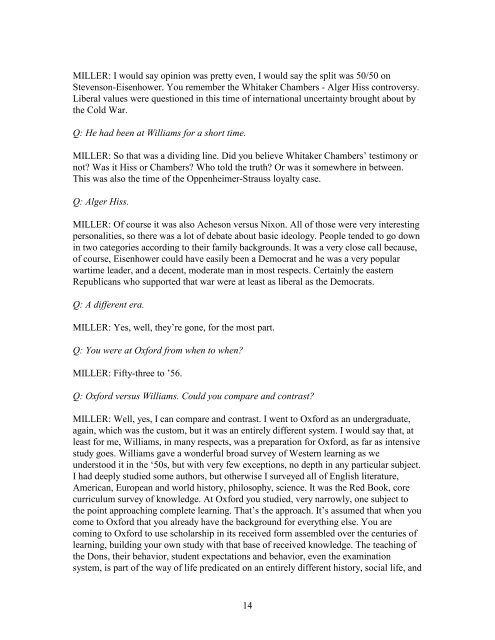1 The Association for Diplomatic Studies and Training Foreign ...
1 The Association for Diplomatic Studies and Training Foreign ...
1 The Association for Diplomatic Studies and Training Foreign ...
You also want an ePaper? Increase the reach of your titles
YUMPU automatically turns print PDFs into web optimized ePapers that Google loves.
MILLER: I would say opinion was pretty even, I would say the split was 50/50 on<br />
Stevenson-Eisenhower. You remember the Whitaker Chambers - Alger Hiss controversy.<br />
Liberal values were questioned in this time of international uncertainty brought about by<br />
the Cold War.<br />
Q: He had been at Williams <strong>for</strong> a short time.<br />
MILLER: So that was a dividing line. Did you believe Whitaker Chambers’ testimony or<br />
not? Was it Hiss or Chambers? Who told the truth? Or was it somewhere in between.<br />
This was also the time of the Oppenheimer-Strauss loyalty case.<br />
Q: Alger Hiss.<br />
MILLER: Of course it was also Acheson versus Nixon. All of those were very interesting<br />
personalities, so there was a lot of debate about basic ideology. People tended to go down<br />
in two categories according to their family backgrounds. It was a very close call because,<br />
of course, Eisenhower could have easily been a Democrat <strong>and</strong> he was a very popular<br />
wartime leader, <strong>and</strong> a decent, moderate man in most respects. Certainly the eastern<br />
Republicans who supported that war were at least as liberal as the Democrats.<br />
Q: A different era.<br />
MILLER: Yes, well, they’re gone, <strong>for</strong> the most part.<br />
Q: You were at Ox<strong>for</strong>d from when to when?<br />
MILLER: Fifty-three to ’56.<br />
Q: Ox<strong>for</strong>d versus Williams. Could you compare <strong>and</strong> contrast?<br />
MILLER: Well, yes, I can compare <strong>and</strong> contrast. I went to Ox<strong>for</strong>d as an undergraduate,<br />
again, which was the custom, but it was an entirely different system. I would say that, at<br />
least <strong>for</strong> me, Williams, in many respects, was a preparation <strong>for</strong> Ox<strong>for</strong>d, as far as intensive<br />
study goes. Williams gave a wonderful broad survey of Western learning as we<br />
understood it in the ‘50s, but with very few exceptions, no depth in any particular subject.<br />
I had deeply studied some authors, but otherwise I surveyed all of English literature,<br />
American, European <strong>and</strong> world history, philosophy, science. It was the Red Book, core<br />
curriculum survey of knowledge. At Ox<strong>for</strong>d you studied, very narrowly, one subject to<br />
the point approaching complete learning. That’s the approach. It’s assumed that when you<br />
come to Ox<strong>for</strong>d that you already have the background <strong>for</strong> everything else. You are<br />
coming to Ox<strong>for</strong>d to use scholarship in its received <strong>for</strong>m assembled over the centuries of<br />
learning, building your own study with that base of received knowledge. <strong>The</strong> teaching of<br />
the Dons, their behavior, student expectations <strong>and</strong> behavior, even the examination<br />
system, is part of the way of life predicated on an entirely different history, social life, <strong>and</strong><br />
14
















